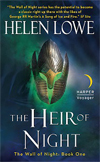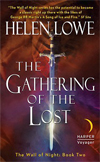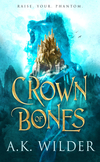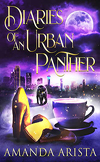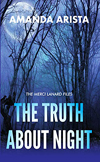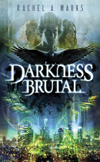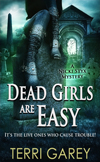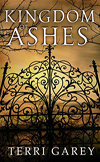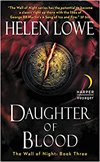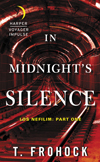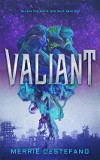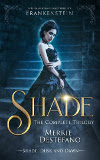Hello everyone! I’m Stina Leicht, and welcome to my very first blog post at Supernatural Underground. I’d like to thank Helen for inviting me. It’s an honor. Hopefully, she won’t live to regret extending that invitation. :)
In case you missed Helen’s lovely introduction, I’ve a new novel, Cold Iron, published by Simon and Schuster’s Saga Press. It’s an Epic Flintlock Fantasy that uses elements from American history. Why did I decide to write about that? Because I like Epic Fantasy, and I also like military fiction. I enjoy quite a few genres that tend to be male-dominated. Sadly, most of the time when I read them I feel unwelcome at best, and at worst, it feels like I’ve immersed myself in openly hostile waters. I’ve long suspected I wasn’t the only one. Therefore, I decided to do something about it. If you’d like to read more, check out this review on Barnes and Noble’s site.
I’ve a confession to make. I’m hooked on old black and white films. I like to think of the ‘40s and early ‘50s as the golden age of dialog. Old comedies are my favorite, but I adore pirate movies, noir, and action films too. It started with the movie, Harvey, which I happened to catch one Saturday afternoon and continued with Arsenic and Old Lace, and Adam’s Rib. Years (and years) later, I discovered Buffy, the Vampire Slayer, Firefly, and the novels of Terry Pratchett. I like thoughtful stories with funny people in them. They make the deep, dark stuff so much more meaningful and human. Mind you, not every character should have a sense of humor. That gets old fast. Dialog should have texture. Some characters should be more serious. Others should speak in clipped tones. That’s more like real life, after all. Everyone has their way of speaking, and characters should too. Ultimately, dialog should say a great deal about the character, the world they’re from, the relationship they have with those with whom they’re speaking as well as the plot.
I’ll start with dialog as world-building. Everyone is familiar with the concept. We all know about accents, but geography and culture have a deeper, more subtle affect on speech. I learned that when I wrote Of Blood and Honey which is set in Northern Ireland. Unlike in American films, in reality an Irish accent isn’t the same all across the country even though its a small island. In fact, in the Irish language there are four distinct dialects. (There are others, but they aren’t officially recognized by the government.) And that’s when the Irish speak Irish. When they speak English, it’s possible for them to tell where someone is from within a few miles. It’s possible to tell a great deal about someone based on how they pronounce the letter “H.” It’s that nuanced. I’ll give you an American example. In Texas, an East Texas accent isn’t the same as a Central Texas accent. People who’ve spent all their lives in East Texas tend to, well… mumble. (And if you want a good example of East Texas dialog, read Joe R. Lansdale.) Central Texas accents are clearer and faster. People from other parts of Texas speak slower and more drawn out. It’s possible to convey these differences without writing in dialect. Listen closely. Ask any poet, language has rhythm. So do accents.
Once I get something down, I read it out loud. I ask myself if the words sound like something someone would actually say. If it doesn’t roll smoothly off the tongue, I fix it. Then I think about the environment the character came from. Are they upper class or lower class? How well educated are they? In addition, the analogies and slang they use should illustrate something about their background. The word choices can hint about about their age too. I once had a discussion with a new writer about whether a teenager would use the word “bosom.” Here’s a hint: they wouldn’t—that is, unless they’ve spent their entire lives around older southern (American) women and were home schooled.
I also like to consider who my characters are speaking to. Are they with someone they respect or love or hate? Do they need to be charming? Do they do anything or say anything different when they lie? And that leads me to how characters handle stress. In Of Blood and Honey, Liam runs his hand through his hair when he’s nervous. In Cold Iron, Nels deals with stress by whistling past the graveyard as it were. The more serious and dangerous the situation, the more he’ll cut up with his friend Viktor. When things get especially intense—particularly when he’s in a helpless position Nels’s speech becomes more formal because court speech is often laced with powerful command magic. Suvi, on the other hand, doesn’t do any of that at all. Her position in authority has never suddenly changed for the worse. She has more control over her emotions than Nels does. She’s also spent more time having to cover her intent. She’s the better liar. In the next novel in the series, one of the characters (Blackthorne) spends a great deal of time as sort of an undercover agent. Whenever he’s extremely angry or emotional he tends to slip into his actual voice. It’s like he forgets the role he’s playing for a moment.
You get the idea. Dialog is more than one character talking to another one. Dialog has a big job and a complicated one.












 Terri Garey is a Supernatural Underground author who writes award-winning and critically-acclaimed urban fantasy. Even though she's a big scaredy-cat who can't watch horror movies or visit haunted houses, she loves moonlit graveyards, moss-covered headstones and the idea that life goes on even after it's over. Her latest release is WHISTLING PAST THE GRAVEYARD, and you can visit her on the web at
Terri Garey is a Supernatural Underground author who writes award-winning and critically-acclaimed urban fantasy. Even though she's a big scaredy-cat who can't watch horror movies or visit haunted houses, she loves moonlit graveyards, moss-covered headstones and the idea that life goes on even after it's over. Her latest release is WHISTLING PAST THE GRAVEYARD, and you can visit her on the web at 







